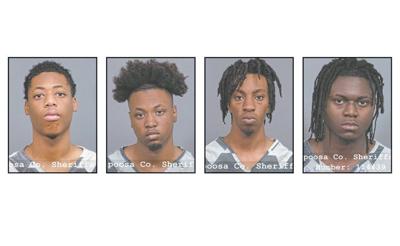Six alleged shooters in connection with the April 15 mass shooting in Dadeville are still awaiting their days in court, but that doesn’t mean there isn’t a lot going on behind the scenes.
Of the six suspects, two of their records are being kept private due to the Alabama Confidentiality Act, which states all juvenile suspects tried as adults remain anonymous unless and until they are convicted.
Wilson Hill, Willie Brown and Johnny Brown, all over the age of 18 at the time of the crime, were all initially tried as adults and their records are public.
All three have entered pleas of not guilty, according to court records. A fourth suspect, Sherman Peters III, was just 15 on April 15, 2023, however his proceeds are public.
The difference in Peters’ case is due to his age. He was initially charged as a juvenile whereas the other two were immediately tried as adults. Since the initial arrests, Peters has been in front of a judge, who ruled his case eligible for the adult court system, therefore his court proceedings are public record despite the Confidentiality Act.
Most recently, Peters was in court Feb. 28 for a youthful offender status hearing, but a mental health evaluation was ordered and the results are still pending, according to court records.
Initially, the identity and likeness of TyReik McCullough and Travis McCullough, who were 16 and 17, respectively, were provided to media outlets by the Alabama Law Enforcement Agency despite the two being juveniles when the crime was committed. However, due to the Confidentiality Act, Tallapoosa Publishers Inc. no longer has access to information about or photos of the McCulloughs.
All six alleged shooters were initially charged with four counts each of reckless murder, 24 counts each of first-degree assault and one count each of third-degree assault. The April 15 shooting left four dead and 32 others injured.
According to Fifth Judicial District Attorney Mike Segrest, all six have been granted motions to sever their trials, which means they will be tried separately.
Although it may seem like a waiting game on the outside, there is plenty of work to be done for Segrest and other investigators.
“Over the course of the last year, there continues to be things that come up,” Segrest said. “It might be victims that had bullets that were retrieved at a later date, where they didn’t go in and get the bullet out at the time, so they would be retrieved and taken into evidence. We’re reviewing all the statements as they come in, videos, body cam videos, all the different interviews.”
Typically, Segrest quantifies a case in hours of work, but this one he said he’d have to put in terms of weeks simply because of the massive load of evidence and witness statements.
“When I still say it’s very much an active investigation, that’s an understatement,” Segrest said. “Voluminous is not even the right word in terms of the amount of evidence. This is obviously one of, if not, the largest mass shootings in Alabama.”
Medical records are another bulk of the evidence pool, as Segrest said he has victim records to review from Russell Medical, East Alabama, Lake Martin Community Hospital, and even UAB and Columbus, Georgia.
“People were sent to hospitals all over the place,” Segrest said. “Putting all that together is very much a daunting task.”
Because of the way district court works, there are only two court terms in Dadeville each year and each lasts two weeks. Segrest predicts each trial for all six defendants will take the entire two-week term. The next Dadeville court term is in June, but Segrest said he doesn’t expect to be ready to try any of the defendants until at least the December court term.
“One thing I’ve been talking with Judge (William) Wharton about is requesting additional jury terms for Dadeville to be able to speed this up,” Segrest said. “Even if we could try one in a week, we couldn’t strike from that same jury pool (for another defendant) so we have to wait till the next term for a co-defendant. With six trials and having only twice a year, it’ll take three years to try these cases and nothing else.”
There are two other capital murder cases set to be tried in Dadeville this year, so Segrest knows the importance of making sure everything can be tried in a timely manner.
That’s so important to him not just because of his job, but because of the relationships he’s formed over the last year.
“It’s something when I took office in January of last year, I never realized how much of an emotional bond that you build with the victims,” Segrest said. “Even though you didn’t know the victim, you learn who they are and everything about them.”
Last October, Segrest had to try three capital murder cases in the four-county district and got convictions in all three.
“But there were tears at every one of them, and during every one of them,” Segrest said. “There were jurors at every one of those that came out and had tears rolling down their faces. It’s just so many emotions with these families, learning about their loved ones.”
Segrest said he’s gotten especially close with Lexi Dowdell, the sister of the late Phil Dowdell, who lost his life during the shooting. It was Lexi’s birthday party where the shooting occurred.
“Every couple weeks since the shooting, we’ve texted,” Segrest said. “She had prom (last) Friday night, and she (went) out of town for her birthday. You just build up those relationships. They’ve become like family. You feel the emotions that they feel and I don’t think anybody would be human if they didn’t.”





